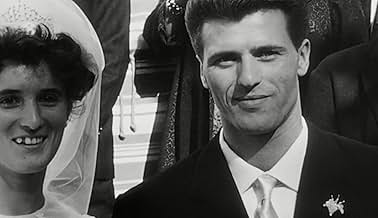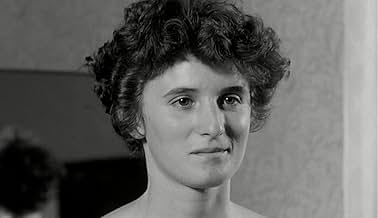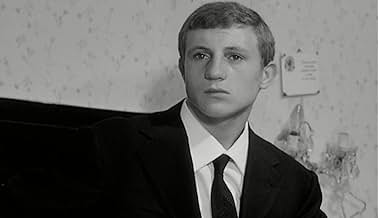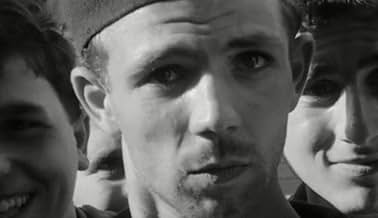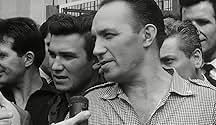IMDb रेटिंग
7.5/10
2.8 हज़ार
आपकी रेटिंग
अपनी भाषा में प्लॉट जोड़ेंDirector Pasolini traverses Italy in 1963 with camera and microphone interviewing people in public places about sex, marriage and gender roles.Director Pasolini traverses Italy in 1963 with camera and microphone interviewing people in public places about sex, marriage and gender roles.Director Pasolini traverses Italy in 1963 with camera and microphone interviewing people in public places about sex, marriage and gender roles.
Lello Bersani
- Narrator
- (वॉइस)
Io Appolloni
- Self - Girl at Lido with Swimming Cap
- (बिना क्रेडिट के)
Graziella Chiarcossi
- Graziella the Bride
- (बिना क्रेडिट के)
Graziella Granata
- Self - Girl at Lido with Long Hair
- (बिना क्रेडिट के)
Pier Paolo Pasolini
- Self - Interviewer
- (बिना क्रेडिट के)
फ़ीचर्ड समीक्षाएं
Pier Paolo Pasolini always has a streak of the documentary filmmaker somewhere in his body of work, where he usually went for expressing his poetic viewpoint on the lower classes (i.e. Mamma Roma) and, later on, the dark fables and tawdry tales of Oedipus Rex and Arabian Nights. If Love Meetings, his only straight documentary feature, isn't completely impressive it may be because in the little moments when he tries for something poetic, oddly enough, like in the numbered transitions, it doesn't really work as well. Those little bits come off as dated 60s stuff. On the contrary though when Pasolini simply takes to the street with a 16mm and a microphone and asks people directly about sex and women's roles and homosexuality and fidelity and freedoms related to all of the above then it gets really interesting. In fact, for a movie relegated to Italian cities and countrysides, with sound-bytes from across the spectrum from college kids to professors (and author Alberto Moravia early on) to farmers in the fields, and done so on the fly and in classic cinema verite style, it doesn't usually feel very old fashioned.
Much of what's discussed and dug up by Pasolini (who reveals himself wonderfully here as a solid journalist, something I would have liked to have seen more of in his career after seeing this) can be relatable for today's youth, if only as a cohesive set of opinions and viewpoints and occasional factoids on standards set between men and women and privacy and liberation and so on. To be sure some of it is stuck in its time and place (practically all of the children asked "Where do babies come from?" say the stork, or something involving God or other). But a lot of it is so absorbing because of the generous flow of ideas- it's a wonderfully edited piece, as sometimes crudely constructed as it is, which is part of the point as a true independent production- and Pasolini's determination to get as much as he can at the heart or whatever at sexual relations and societal norms and what's changed over time in Italy and if there can be any more change in the future. It's probably the most obvious example from the director to screen in a sociology class. 8.5/10
Much of what's discussed and dug up by Pasolini (who reveals himself wonderfully here as a solid journalist, something I would have liked to have seen more of in his career after seeing this) can be relatable for today's youth, if only as a cohesive set of opinions and viewpoints and occasional factoids on standards set between men and women and privacy and liberation and so on. To be sure some of it is stuck in its time and place (practically all of the children asked "Where do babies come from?" say the stork, or something involving God or other). But a lot of it is so absorbing because of the generous flow of ideas- it's a wonderfully edited piece, as sometimes crudely constructed as it is, which is part of the point as a true independent production- and Pasolini's determination to get as much as he can at the heart or whatever at sexual relations and societal norms and what's changed over time in Italy and if there can be any more change in the future. It's probably the most obvious example from the director to screen in a sociology class. 8.5/10
Amid some unsurprising considerations from major italian popular figures of the time, Pasolini publicly asks questions related to sex, ethics, sociology and politics to those bold and naive enough to attempt an answer.
The value of such an endevour - wether it is hundreds or hundreds of thounsands of interviews - is (admittedly by the author) debatable at best except for some - nowadays obvious - sociological observations.
Fortunately Pasolini closes (and saves) the film with a greatly poetic final 3 minutes section that feels like a wrap up of the "results" of his inquiry:
"Do men care about anything but living life? A couple getting married. They don't know anything about their love. Life is merciless the most when it is happy and innocent. The knowledge of what's good or evil lies ahead of this forgetfulness of those busy living. And those knowing don't talk in front of such a grace unwilling to learn. But this silence is criminal."
IMHO the movie is in this aphorism. While never boring the interviews are not really interesting (let alone sociologically relevant) either. The documentary was released rated for 18yo: a side note that again summarizes the point we can make today out of it.
Fortunately Pasolini closes (and saves) the film with a greatly poetic final 3 minutes section that feels like a wrap up of the "results" of his inquiry:
"Do men care about anything but living life? A couple getting married. They don't know anything about their love. Life is merciless the most when it is happy and innocent. The knowledge of what's good or evil lies ahead of this forgetfulness of those busy living. And those knowing don't talk in front of such a grace unwilling to learn. But this silence is criminal."
IMHO the movie is in this aphorism. While never boring the interviews are not really interesting (let alone sociologically relevant) either. The documentary was released rated for 18yo: a side note that again summarizes the point we can make today out of it.
In this documentary, Pasolini travels around Italy and interviews random people in public places about their attitudes towards sexuality, marriage, and gender issues. It's fascinating to hear how Italians in the early 1960s felt about these topics, and there are plenty of opinions that seem shocking from a modern perspective. There are people who think that divorce should be illegal (they'd rather have spouses kill each other), parents who find it perfectly normal for 14 year-old boys to lose their virginity with a prostitute, and women who think it's only right that they have less rights and freedoms than men. It's especially interesting to hear the interviewees confess their unabashed disgust towards homosexuals to the secretly gay director.
However, I can't help but wonder if it wouldn't have been more interesting to include some interviews that weren't conducted in public places with groups of people standing around. As it stands, the movie gets a bit repetitive after a while and probably would have been more effective with a shorter running time.
However, I can't help but wonder if it wouldn't have been more interesting to include some interviews that weren't conducted in public places with groups of people standing around. As it stands, the movie gets a bit repetitive after a while and probably would have been more effective with a shorter running time.
I too was disappointed, but not for the reasons cited in the previous comment.
Instead, I found the film very hard to follow, with lots of academic buzzwords (interviewer Pasolini refers to "the sex problem" at least 20 times), not all of it subtitled, and subtitles that faded out of legibility against light backgrounds.
The movie was visually unappetizing, in part because of inconsistent and often inept camera work, and in part because of a sloppy transfer to tape that washed out the middle tones and often made it hard to see and read people's faces.
The most annoying element was the recurrent muting of the voice tracks (and of course the accompanying sub-titles) that was labeled "self-censorship." Was this a comment on official censorship of the time? I get the impression that the most interesting answers were lost to the audience through this process.
An interesting and meaty idea from a provocative and often great filmmaker, undercut by directorial inexperience and poor repackaging.
Instead, I found the film very hard to follow, with lots of academic buzzwords (interviewer Pasolini refers to "the sex problem" at least 20 times), not all of it subtitled, and subtitles that faded out of legibility against light backgrounds.
The movie was visually unappetizing, in part because of inconsistent and often inept camera work, and in part because of a sloppy transfer to tape that washed out the middle tones and often made it hard to see and read people's faces.
The most annoying element was the recurrent muting of the voice tracks (and of course the accompanying sub-titles) that was labeled "self-censorship." Was this a comment on official censorship of the time? I get the impression that the most interesting answers were lost to the audience through this process.
An interesting and meaty idea from a provocative and often great filmmaker, undercut by directorial inexperience and poor repackaging.
Pasolini had some topics of interest, and in this documentary he enquires the italian populace about some of them!
The movie follow some kind of structure, but the overall concept is Pasolini interviewing groups of people in several different places. I find some of the question he does a little vague but for at the time being were quite outrageous!
There's the general depiction of how people thought about in the 60's Italy and although both Pasolini and the crowd had some outdated use of language for today standards, there are several interesting points of view for further analysis. Even Pasolini had to regulate some of the answers here with an amusing "autocensura"!
I'm not very fond of documentaries, it drags on a bit after a while , but I found myself engaged at moments.
The movie follow some kind of structure, but the overall concept is Pasolini interviewing groups of people in several different places. I find some of the question he does a little vague but for at the time being were quite outrageous!
There's the general depiction of how people thought about in the 60's Italy and although both Pasolini and the crowd had some outdated use of language for today standards, there are several interesting points of view for further analysis. Even Pasolini had to regulate some of the answers here with an amusing "autocensura"!
I'm not very fond of documentaries, it drags on a bit after a while , but I found myself engaged at moments.
क्या आपको पता है
- कनेक्शनEdited into Lo schermo a tre punte (1995)
टॉप पसंद
रेटिंग देने के लिए साइन-इन करें और वैयक्तिकृत सुझावों के लिए वॉचलिस्ट करें
- How long is Love Meetings?Alexa द्वारा संचालित
विवरण
बॉक्स ऑफ़िस
- दुनिया भर में सकल
- $2,789
- चलने की अवधि1 घंटा 32 मिनट
- रंग
- ध्वनि मिश्रण
- पक्ष अनुपात
- 1.85 : 1
इस पेज में योगदान दें
किसी बदलाव का सुझाव दें या अनुपलब्ध कॉन्टेंट जोड़ें



